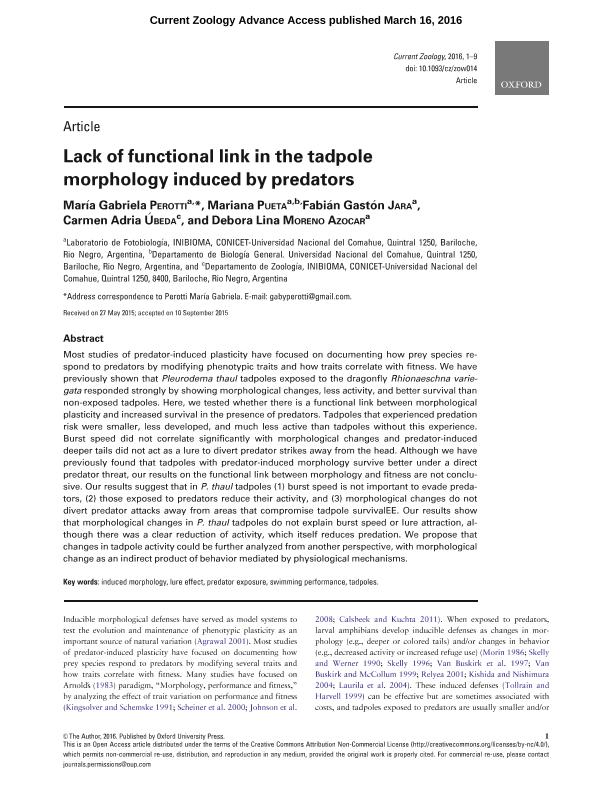Artículo
Lack of functional link in the tadpole morphology induced by predators
Perotti, Maria Gabriela ; Pueta, Mariana
; Pueta, Mariana ; Jara, Fabian Gaston
; Jara, Fabian Gaston ; Ubeda, Carmen Adria; Moreno Azócar, Débora Lina
; Ubeda, Carmen Adria; Moreno Azócar, Débora Lina
 ; Pueta, Mariana
; Pueta, Mariana ; Jara, Fabian Gaston
; Jara, Fabian Gaston ; Ubeda, Carmen Adria; Moreno Azócar, Débora Lina
; Ubeda, Carmen Adria; Moreno Azócar, Débora Lina
Fecha de publicación:
16/03/2016
Editorial:
Oxford University Press
Revista:
Current Zoology
ISSN:
1674-5507
e-ISSN:
2396-9814
Idioma:
Inglés
Tipo de recurso:
Artículo publicado
Clasificación temática:
Resumen
Most studies of predator-induced plasticity have focused on documenting how prey species respond to predators by modifying phenotypic traits and how traits correlate with fitness. We have previously shown that Pleurodema thaul tadpoles exposed to the dragonfly Rhionaeschna variegata responded strongly by showing morphological changes, less activity, and better survival than non-exposed tadpoles. Here, we tested whether there is a functional link between morphological plasticity and increased survival in the presence of predators. Tadpoles that experienced predation risk were smaller, less developed, and much less active than tadpoles without this experience. Burst speed did not correlate significantly with morphological changes and predator-induced deeper tails did not act as a lure to divert predator strikes away from the head. Although we have previously found that tadpoles with predator-induced morphology survive better under a direct predator threat, our results on the functional link between morphology and fitness are not conclusive. Our results suggest that in P. thaul tadpoles (1) burst speed is not important to evade predators, (2) those exposed to predators reduce their activity, and (3) morphological changes do not divert predator attacks away from areas that compromise tadpole survivalEE. Our results show that morphological changes in P. thaul tadpoles do not explain burst speed or lure attraction, although there was a clear reduction of activity, which itself reduces predation. We propose that changes in tadpole activity could be further analyzed from another perspective, with morphological change as an indirect product of behavior mediated by physiological mechanisms.
Archivos asociados
Licencia
Identificadores
Colecciones
Articulos(INIBIOMA)
Articulos de INST. DE INVEST.EN BIODIVERSIDAD Y MEDIOAMBIENTE
Articulos de INST. DE INVEST.EN BIODIVERSIDAD Y MEDIOAMBIENTE
Citación
Perotti, Maria Gabriela; Pueta, Mariana; Jara, Fabian Gaston; Ubeda, Carmen Adria; Moreno Azócar, Débora Lina; Lack of functional link in the tadpole morphology induced by predators; Oxford University Press; Current Zoology; 62; 3; 16-3-2016; 227-235
Compartir
Altmétricas



